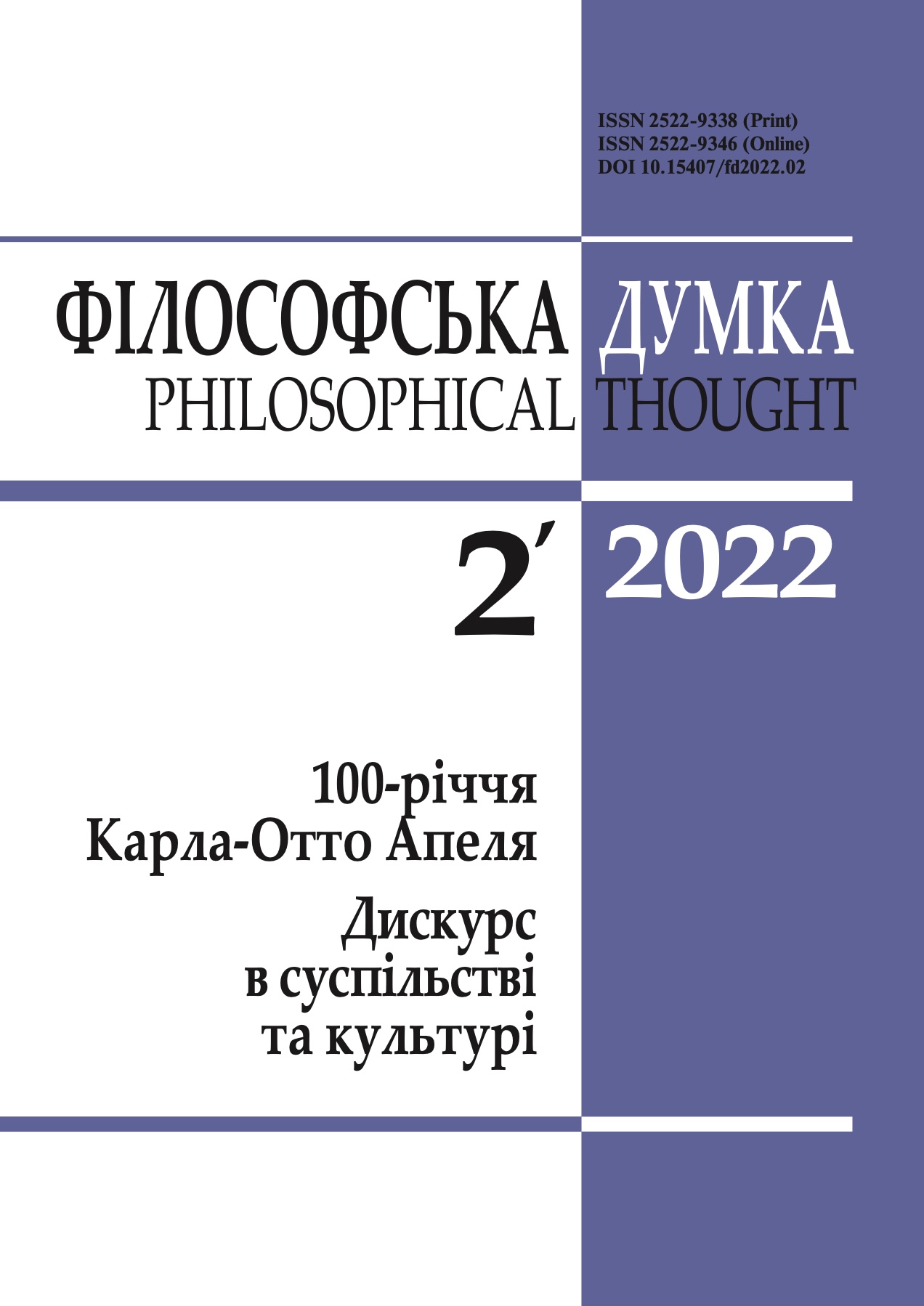MEMORY DISCOURSES AND CRITICAL SCIENTIFIC HISTORY. ON THE SPECIFICITY OF MODERN HISTORICAL DISCOURSES
DISCOURSE IN SOCIETY AND IN CULTURE
DOI:
https://doi.org/10.15407/fd2022.02.108Keywords:
discourses of memory, collective memory, affirmative historiography, critical history, historicity, traditionAbstract
The word «history» can always be understood in two different meanings: as what happened in the past and as a story about the past. One and the same past can be described in different ways. The gap between historical events and representations of these events determines the diversity of historical discourses. Shifting the focus of the philosophy of history from identifying the con- ditions for the possibility of historical knowledge to the analysis of the process of historiography reflects an understanding of the fundamental nature of historical discourses for the formation of pictures of the past.
But the fascination with the subject of historical representation often overshadows what makes it possible in principle. Historical discourse is a modern narrative of the past. Thus, the condition for the possibility of historical discursiveness is the mediation of the horizons of the present and the past, which is a fundamental feature of the historicity of human existence.
This article explains the discourses of memory and oppositional critical scientific history. Discourses of memory are considered as modern forms of manifestation of the historicity of human existence, because it is in them that the constant mediation of time horizons of the past and present becomes thematic. Critical history declaratively opposes the discourses of memory, but reveals the dependence of its methodological foundations on predetermined forms of under- standing the past presented in memory.
The opposition between the discourses of memory and critical history structurally repeats the opposition of tradition and scientific history revealed in hermeneutics. The conceptual shift from tradition to memory reflects the fundamental changes in the modern understanding of historicity associated with the further detraditionalization and globalization of the world. Me- mory appears as a new form of understanding the past, associated with the fear of losing it, as well as understanding the distances and gaps in relation to it.
Based on the differentiation of collective memory types, the corresponding types of dis- courses are distinguished. It is argued that historical discourses of identity cannot be identified with historical discourses of power, and historical-didactic and historical-aesthetic discourses are independent forms of modern attitude to the past. In an effort to separate critical reconstruc- tion from memory, scientific discourses become counterfactual to the taken for granted past, represented in the narratives of collective memory.
References
Anderson, B. (2006). Imagined Communities. Reflections on the Origin and Spread of Natio- nalism. London, New-York: Verso.
Ankersmit, F.R. (1983). Narrative Logic. A Semantic Analysis of the Historian's Language.The Ha- gue, Boston, London: Martinus Nijhoff Publishers.
Assman, J. (2011). Cultural Memory and Early Civilization. Writing, Rememberance, and Political Imagination. Cambridge University Press.
https://doi.org/10.1017/CBO9780511996306
Assman, J. (2013). Communicative and Cultural Memory. In: The theoretical foundations of Hun- garian "lieux de memoire" studies (Loci Memoriae Hungaricae 1), 36-43.
Assman, A. (2014). The Long Shadow of the Past: Memorial Culture and Historical Politics [in Russian]. Moscow: New literary review.
Ferguson, N. (1999). Virtual History: Towards a "chaotic" theory of the past. In: Virtual History: Alternatives and Counterfactuals. Cambridge: Basic Books, 1-90.
Gadamer, Hans-Georg. (2000). Wahrheit und Method. Grundzuge einer Philosophischen Herme- neutic [in Ukrainian]. 1. Kyiv: Universe.
Haidegger, M. (1967). Sein und Zeit. Tübingen: Max Niemeyer Verlag.
Halbwachs, M. (1968). La Mémoire Collective. Paris: Presses Universitaires de France. Huyssen, A. (2000). Present Pasts: Media, Politics, Amnesia. Public Culture, 12 (1), 21-38.
https://doi.org/10.1215/08992363-12-1-21
Kasianov, G. (2016). Historical policy and the memorial laws in Ukraine: the beginning of the 21st century. [In Russian]. Historical expertise, 2, 28-55.
Koselleck, R., Sebastián, J.F., & Fuentes, J.F. (2006). Conceptual History, Memory, and Identity: An Interview with Reinhart Koselleck. Contributions. Vol. 2, no. 1, 99-127.
https://doi.org/10.1163/187465606783406153
Koselleck, R. (2005). Vergangene Zukunft. Zur Semantik geschichtlicher Zeiten. [In Ukrainian]. Kyiv: Duch I Litera.
Lowhental, D. (2015). The Past is a Foreign Country. Cambridge: University Press.
https://doi.org/10.1017/CBO9781139024884
Megill, A. History, memory, identity. History of the Human Sciences, 11(3), 37-62.
https://doi.org/10.1177/095269519801100303
Megill, A. (2007). Historical Knowledge, Historical Error. A contemporary guide to practice. The University of Chicago Press.Chicago and London.
Nora, P. (1984). Entre mémoire et histoire : la problématique des lieux. Dans: Les Lieux de mémoire, tome 1 : La République. Paris: Gallimard, xvii-xlii.
Reulecke, J. (2008) Generation, Generativity, and Memory. Cultural memory studies: an international and interdisciplinary handbook. Berlin. New-York: Walter de Gruyter, 119-125.
Ricoeur, P. (2000). La mémoire, L'Histoire, L'Oubli. Paris: Édition du Seuile.
White, H. (1998). Encounters. In: Philosophy of History after Postmodernism. Charlottesville and London: The University Press of Virginia, 13-38.
Zymovets, R.V. (2021). About benefits and harms of rewriting history. One of the topic of contemporary historical discourses: philosophical analysis. [in Ukrainian]. Philosophical Thought, 2.
Downloads
-
PDF (Українська)
Downloads: 232
Published
How to Cite
Issue
Section
License
Authors who publish with this journal agree to the following terms:
- Authors retain copyright and grant the journal right of first publication.
- Authors are able to enter into separate, additional contractual arrangements for the non-exclusive distribution of the journal's published version of the work (e.g., post it to an institutional repository or publish it in a book), with an acknowledgement of its initial publication in this journal.
- Authors are permitted and encouraged to post their work online (e.g., in institutional repositories or on their website) prior to and during the submission process, as it can lead to productive exchanges, as well as earlier and greater citation of published work (See The Effect of Open Access).


